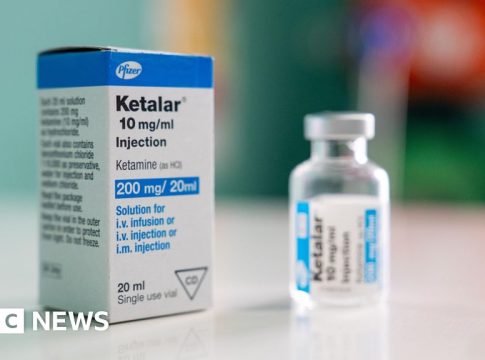Exploring Ketamine as a Treatment for Severe Depression
In recent years, ketamine has garnered attention not only for its use as an anesthetic but also for its potential in treating severe depression. While traditionally viewed as a controversial party drug, interest in ketamine-assisted therapy is growing in Scotland, particularly for individuals who have not found relief through conventional treatments.
The Promise of Ketamine Therapy
Dr. Andrew McIntosh, a psychiatrist with NHS Lothian, is at the forefront of this exploration. He aims to open a clinic at the Royal Edinburgh Hospital by the year’s end, specifically targeting patients struggling with treatment-resistant depression—those who have tried multiple therapies without success. Ketamine may offer hope for these individuals, as studies suggest it could be effective in altering brain chemistry and enhancing emotional resilience.
Understanding Ketamine: A Controlled Approach
Although ketamine is classified as a narcotic and often associated with recreational use, in clinical settings, it is administered in a precisely controlled manner. It is crucial to distinguish between the type of ketamine used therapeutically and that which is often misused. Under medical supervision, patients receive lower doses in a safe environment, minimizing risks associated with recreational use.
What to Expect
- Therapeutic Supervision: Ketamine treatment is typically accompanied by therapy, allowing individuals to unpack their experiences and emotions in a supportive space.
- Individual Assessments: Each patient undergoes thorough evaluations to ensure their suitability for the treatment, ensuring a tailored approach to care.
Personal Experiences
Patients like Alex, who sought ketamine treatment after finding traditional therapies inadequate, report transformative experiences. With the support of professional guidance, many describe feeling more receptive to psychotherapy and experiencing shifts in their emotional well-being.
“I feel like I’m getting back to the person I used to be,” one patient shared, illustrating the potential benefits of this emerging therapy.
The Future of Ketamine in Mental Health Treatment
While current private clinics, like the Eulas clinic in Hamilton, charge for ketamine therapy, there is hopeful momentum toward integrating such treatments into the NHS. Dr. Sean Gillen, director of Eulas, emphasizes the necessity of collaboration between private and public health sectors to make this service accessible.
Important Considerations
- Cost and Accessibility: The financial implications of ketamine therapy may restrict access for some, highlighting the need for NHS involvement.
- Cautious Optimism: Professional organizations, including the Royal College of Psychiatrists, advocate for careful consideration as further research emerges. A report on the use of psychedelics in therapy is anticipated, shedding more light on ketamine’s therapeutic potential.
Conclusion: A Compassionate Choice
As we stand at the crossroads of traditional and innovative treatment options for depression, ketamine presents a compelling opportunity for those in need. Guided by professional assessment and care, this treatment could provide a pathway toward healing for many. For anyone grappling with severe depression, the ongoing exploration of options like ketamine therapy is a reminder that hope and help are always within reach.
As always, it is crucial to consult with a qualified healthcare provider before considering any new treatment. Understanding your unique needs is the first step toward effective and compassionate care in your mental health journey.

Covers wellness, nutrition, mental health, and daily life tips.
Bio: Talia brings a background in health journalism and holistic living to help readers live better, one tip at a time.

